- Home
- Brian Spangler
Going Gray Page 2
Going Gray Read online
Page 2
“I hate you for this,” Emily’s mother said, leaving for the kitchen. Her father’s head slumped and he pushed his hands over his face. Seeing him like that scared her. Emily pawed at her arms, and saw the first visible signs of what the poison was doing. Blotchy red patches had formed, some of them rising in watery blisters. She instinctively reached for her face, but found nothing. At once, the urge to leave became overpowering. It wouldn’t be long before Death’s poison breath took their home. They needed the security of a solid building; something more than just flimsy walls. What was done, was done. She loved Ms. Quigly, but dead is dead—you can’t fix that.
“Dad, we’re running out of time,” she told him. “Tell us what to do!” He lifted his head, and his eyes grew wide when he saw her arms.
“Emily, girl, let me see,” he answered, lifting her hand. “You’re so much more fairer than we are. You have to cover up more. Long sleeves—cover everything.” He looked at his own arms, which were clear of any welts. He ran his hand along the side of her long red hair, then leaned in, kissing her atop the head.
“I think I can even taste what’s out there. Can you?” Emily asked. He let out a phlegmy cough, and nodded.
“It’s the salt.” His tone was settled, but his face wandered, searching for her mother.
“Salt?”
He started to speak, but then stopped. She could sense his uncertainty. “The salt in the ocean. We’re using it. But it was supposed to save us.” He turned away, glancing to the front window. A curtain of rolling mist pushed against the glass, sliding over the surface like heavy smoke. “But this isn’t right. The weight is pulling the clouds down, and changing them.”
“How long?” Emily asked. “How long do we have?” Her father closed his eyes. His lips danced without a sound. He was thinking. Calculating. It’s how he worked. She liked to tease him about it sometimes, but didn’t feel the urge to do so now. He shook his head, and the cramped expression from earlier returned.
“I’ve got to stop it!” he blurted, and then pulled her into his arms. “I’ve got to get to the machine and stop this!”
“What’s going on?” a small voice chirped from behind them. “Daddy, I’m itchy in my eyeballs and inside my mouth—yuk.” They turned to see Emily’s little brother, bleary-eyed, his security blanket hanging from one hand, dragging behind him. Emily knelt, running her fingers up the long sleeve of his pajamas to check his arms. No welts. Her brother had the same dark complexion as their father and mother. For now, she was the only one showing any signs of burning. But if they didn’t move, that’d change soon.
“Justin, listen to me.” Her father’s knee popped as he knelt down, spurring a giggle from the little boy. “I have to go to work today, and while I’m gone, you need to listen to your mother and sister. Understand?” Justin swiped at the salty sting on his skin, but gave his father a firm nod.
“But I… I always listen,” he answered, jumping into his father’s arms. “Daddy, I heard something. I don’t know, but I think I heard something bad.”
“Don’t you worry about what you heard. Don’t you listen to anything except for what your mom and sister tell you. Can you run upstairs and get dressed for me?”
Justin’s feet were moving before they hit the floor. The scratchy sound of footed pajamas skidded away from them, thumped up the stairs.
“Is Justin getting ready?” her mother asked. Her face had been wiped clean of tear stains, but her eyes stayed puffy and red. “I’ve packed all the food and water that we can carry. The batteries, radio and the flashlight are in the car, too. How safe is the car?”
“The cars will last longer than the house,” he answered. “You went into the garage? How is it?”
“Stronger. I can smell it,” her mother said, shaking her head. “I can feel a bit of burn, too. But I think it’s safe.”
“Good… good, I can probably open the garage a minute and then close it.” Emily considered what her father said.
“But why would we do that?” she asked. “We won’t be coming back. Will we?” Her father didn’t answer. Instead he was counting again, his lips bumping up and down over numbers she couldn’t hear.
“I think we can time this,” he said to himself. “And I’ve already got stuff in my car, too.”
“Wait Phil! We’re going together,” her mother exclaimed. Emily watched her mother fold her arms and straighten her back, objecting to what he had planned. But her father only shook his head, resolute.
They all jumped when an explosion rumbled overhead, shaking their house. She heard something fall, crashing onto their roof, and pieces of ceiling fell behind her. But it wasn’t the roof. Like before, the sound had come from inside. It was their entire home, quickly succumbing to the outside air like Ms. Quigly had.
“So fast,” her father mumbled. His eyes stayed on the ceiling as if waiting for it squash them. Instinct brought his arms up to protect his family. “House isn’t going to last as long as I’d hoped. No stone or brick.”
“What does that mean?” Emily asked, as cracking and breaking sounds thundered through their home.
“Rafters are coming apart… not long before the roof collapses.” His answer was clinical, like some morbid diagnosis, and she felt hurt that he could sound so callous about their home. He looked at their faces and shook his head. “We’re out of time.”
“But you’re going with us!” her mother implored.
“I’m going to take my car. You take the kids in your car,” he started to say. But her mother was already shaking her head, disagreeing. Her father stepped forward and placed his hands on her arms. “Listen to me. Listen to me, Barbara. You need to be strong today.” He nodded his head encouragingly. “Get to the mall, like we did during the last hurricane. The building is safer than anything else around here.”
He’s not going with us? Emily became confused and scared by her parents’ exchange.
“But how safe is the machine?” she asked, suddenly realizing the danger. And when she saw her father’s expression change, a deep terrible intuition struck her. Her lips began to tremble and she grabbed her father’s arm. “Daddy, no! Don’t go. You have to come with us!”
He looked to her then, a desperate fear in his eyes. His lips were pressed firm, thinning until the color in them was gone, matching the gray that had taken their world.
“I have to stop the reactor before it’s too late.”
“How much time?” her mother asked. “How much time before it won’t make a difference what you try to do?” He pinched the bridge of his nose, and his lips began to move again. Counting. Revising.
“An hour… maybe two at most,” he answered. “But I have to get inside. I have to flood it with seawater.”
“But if you’re inside?” Emily started to ask, and felt the first tears before he could answer. Her father took hold of his daughter, his wife, pulling them both into his arms. Emily dug her fingers into his shirt, holding onto him, knowing he might not make it back.
“I’m going to make this right!” he said, and then was suddenly gone, leaving them alone.
II
THE RUN
The engine turned once and then sputtered before dying. Emily’s mother cursed under her breath, thumping her palm against the steering wheel. The sound of her foot pumping up and down on the gas pedal came next. She turned the key again, holding it there while the motor grunted objections. The motor turned over, sputtered again, and then finally roared to life.
“Oh my God—thank you,” she sighed, and leaned in to kiss the steering wheel. “I don’t know what we would have done.”
“Call Dad!” Justin cried out from the back seat. Emily turned to see her little brother tucked away in his car seat, his blanket pulled up just beneath his chin, a thumb stuck in his mouth. Out of habit, Emily raised her hand, wiggling her thumb for him to see. His expression changed, shame filling his eyes. A distant crash pulled her attention away. When she looked back, he’d already popped his thu
mb back in, turning his face away to stay clear of her eyes.
Can’t hurt him now, she thought sadly. Her little brother had no idea what was on the other side of the garage door. None of them did. He had no idea that somewhere between here and the shopping mall, they might all be dead.
“Emily,” her mother interrupted. “Does your phone work?” Until Justin’s suggestion, the thought hadn’t occurred to her to check for a signal.
“Four bars,” she said, relieved. “I’ve got four solid bars and a full battery, too.”
She jumped almost clear out of her seat when the garage door behind them began rolling up, clanking metal on metal.
“Power isn’t out for good yet,” her mother said. It had been flickering on and off like a failing fluorescent bulb while they hustled Justin out to the car. “Won’t be long though.”
Emily stretched to look outside. Gray mist fell into the opening of the garage, but stayed at the entrance. They were safe. But for how long? She could see nothing beyond it. Another bang hollered from inside the home, and she imagined a wall or ceiling collapsing.
Emily dropped back down to her seat and bit nervously on her fingers. She had her bad habits too. She glanced over to Justin, who seemed intent on his thumb-sucking, yet oblivious to what was going on.
The mall was a good idea—a great idea. But how were they going to find it?
“Mom… how are we going to drive through this?” she asked, and watched her mother slump against the steering wheel.
“Dad’s driving,” Justin answered. “He said he had to go to work—remember?” Her mother bolted up and jabbed a finger at the car’s dash.
“The GPS,” she answered. “Has to be. It’ll be our eyes.”
“Can it get a signal through this stuff?”
“Works when there’s a rainstorm, right?”
“Yeah… yeah, it does,” Emily answered, knowing it didn’t matter. The GPS had to be their eyes. They didn’t have a choice. They didn’t have anything else.
“What is that?” her mother asked. Emily followed her mother’s gaze as a cloud of chalky debris fell onto the windshield. Ticking sounds tapped against the roof of the car like heavy rain, and for a brief moment, she thought the gray mist had come inside to take them. But the dust was too heavy, and had already started to leave a thin coat on the hood. The wall in front of them moved, bulging outward as if taking a dying breath. Large cracks sprayed from the center, spidering in every direction. The ceiling…
“Mom, we have to move. NOW!”
“What is it?”
“Hit the gas, Mom!” Emily screamed, realizing the house was caving in on them. “Go, Mom! Go!”
If they didn’t move now, they’d be trapped beneath the rubble. A blast shook the car, splintering the wood that held their house together. Emily felt the bite of tears as their home died around them, collapsing. Chunks of ceiling and wood crashed on top of the car. The loud thud jarred them, startling Justin. Emily turned in time to see his eyes narrow as his face cramped with fright.
“What’s happening?” he cried.
“It’s okay, Justin, we’re leaving!” her mother answered, but she seemed stuck, fumbling with the shifter as more debris fell on top of them. Another explosion thundered from somewhere high above them, and Emily thought of the rafters and the roof, like her father had said. Wood tore like paper, throwing bombs of insulation and drywall all around them. The ruckus grew, becoming louder, and sounded like a thousand campfires hissing and popping as they burned through acres of forest.
“My house,” her mother cried, and Emily felt her mother’s anguish, but now wasn’t the time to mourn. Emily sat high on her seat, begging that they get out of the garage. She grabbed the car’s shifter, pressing the button and throwing them into reverse. The car sped backward, clipping the side of the house as it careened out of the crumbling garage.
When their car became engulfed by the fog, her mother slammed on the brakes. She was breathing hard, sweating, her face full of shock and fear. Emily shrank back into her seat. A thunderous sound came, and more debris pummeled the car, forcing her mother to turn away. Emily reached over, taking her mother’s hand, trying to ease some of the tears. She wanted to cry too, imagining their house crumpled and destroyed, but they had to keep moving.
“Come on, Mom,” she said. “Nothing we can do.”
Emily grabbed for the GPS and tapped furiously at the pale black screen. The small display sprang to life. Her mother joined in, quickly finding the shopping mall, and pinned the location.
“You ready?” she asked, looking over. Emily nodded somberly. “I’ll watch the road as best I can. You tell me the direction to go.”
Almost at once, they ran over something. Her mother cringed at the sound, and the car lifted up and then dropped.
“Don’t stop, Mom!” Emily yelled. “If you stop, you might get the car stuck on it.” Her mother pressed the gas pedal, throwing the car over whatever it was they’d hit. Emily’s heart tightened when she considered the dead bodies. What if they’d run over someone?
“It’s just the mailbox!” her mother yelled. “I saw it at the very last second.” As they drove blindly away from their home, Emily struggled to rid her mind of what their house must look like. She shook her head, faced forward, and let the sentiment fall out of her.
“Almost at the end of our street,” her mom announced. “We’ll be able to move faster soon. Just hope there aren’t other cars.”
A buzz came from her pocket, vibrating across her bottom. It was a new message. Excited, she grabbed her phone.
“Is that a text?” her mother asked. “Is it your father?”
“Are you guys okay?” she read aloud. “Yeah, it’s from Dad!”
“Quick, tell him we’re on our way. Ask him how he’s doing.”
Emily typed, thumbing the keyboard, shortening nearly every word to mere letters. She hit send, and felt the car lift up and fall back down.
“What was that?” But her mother only shook her head, then glanced at the rearview mirror.
“No idea. But I know what I hope it wasn’t.”
“How fast?”
“I’m staying below ten. I don’t want to go too fast… you know, in case we hit something.”
“Yeah, but what if someone hits us!” Emily answered sharply. Her mother raised her brow, realizing the danger. Emily’s phone buzzed twice more.
“Dad says that he’s nearly there. And that he loves”—Emily’s voice choked up—“he loves us very much.”
The car became quiet as Emily watched her mother’s face grow red.
“Call him,” her mother demanded, looking over. Emily didn’t hesitate, and pressed the icon to make the call. She put her phone on speaker, letting the unanswered rings echo in the car. The tension weighed heavy with each jingling tone. The call broke suddenly to an all circuits busy message.
“Can’t do this now,” her mother said, muttering more words under her breath. She stopped, becoming choked up, and then continued. “He should’ve come with us, should have… but he made his choice.”
“Mom,” Emily said. “He’s trying to stop this.”
Her mother snapped her head around, glaring, her expression filled with disappointment. The look made Emily feel small and stupid for having spoken up to defend her father. Her mother could always do that. One look was all it took.
“He can’t stop it! He knows he can’t stop it! They thought they could control the oceans, the weather, like the planet was something they could just tinker with!” Her voice grew, filling the car. “He should be with his family. You tell him that!” While the words were meant for Emily’s father, they still stung. Emily looked down at her phone, the cursor blinking on and off, waiting. She started to type.
“Wait,” her mother blurted. “Don’t say that. Just tell him we love him—” Emily hit send before her mother could finish.
“Already did,” she answered. “I also told him that we’ll see him at the mal
l.” For a moment, her mother said nothing, only stared ahead.
“Exactly when did you get so smart?” she finally said. Emily felt her cheeks warm.
“I was always smart,” Emily answered. “You’re just starting to notice.”
“Love you, girl,” her mother said, stretching to rub her shoulder. “We’ll get through this. Family.”
“I think it’s safe to go faster,” Emily said, hoping her mother would agree. She was feeling the urgency once again; they had to get moving. “If Dad’s already close to work, he must be moving faster: a lot faster.”
Her mother leaned into the steering wheel, peering into the fog, trying to see more than the gray covering them.
“Well,” she said, and neatly moved the GPS. “I’ll try to go faster, but keep your eyes on the screen.”
Emily watched the screen’s triangle move along the highlighted path. The map revealed a world she could no longer see. As she glanced out the window and then back to the GPS, she found it hard to grasp what had happened. Hidden beneath all that gray were roads and buildings, even creeks and small ponds. All of them were showing up on the screen, but she could see none of it.
No sooner had their speed increased than the first in a series of bumps lifted the car, dropping them down hard each time. Any harder and she thought that the car might stall. Her mother eased off the gas, slowing, but didn’t stop.
What the GPS didn’t show them was all the debris. A new concern—not just about people, but stranded cars, dead animals. How many animals had wandered into the fog, collapsing onto the road’s blacktop? And she guessed that there wouldn’t just be the occasional squirrel or possum, but deer; big enough to destroy their car.

 Affair with Murder The Complete Box Set
Affair with Murder The Complete Box Set Killing Katie
Killing Katie Painful Truths
Painful Truths Grave Mistakes_A Deadly Vigilante Crime Thriller
Grave Mistakes_A Deadly Vigilante Crime Thriller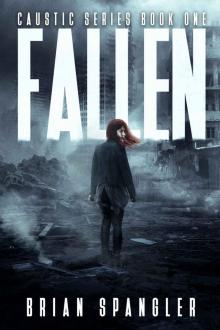 Fallen: Post-Apocalyptic Dystopian Thriller - Book 1 (Caustic)
Fallen: Post-Apocalyptic Dystopian Thriller - Book 1 (Caustic)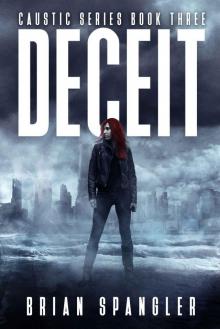 Deceit: Post-Apocalyptic Dystopian Thriller - Book 3 (Caustic)
Deceit: Post-Apocalyptic Dystopian Thriller - Book 3 (Caustic)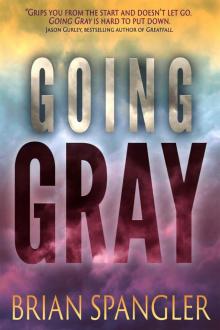 Going Gray
Going Gray Union
Union Grave Mistakes: A Deadly Vigilante Crime Thriller (Affair with Murder Book 3)
Grave Mistakes: A Deadly Vigilante Crime Thriller (Affair with Murder Book 3) End of Gray Skies: An Apocalyptic Thriller
End of Gray Skies: An Apocalyptic Thriller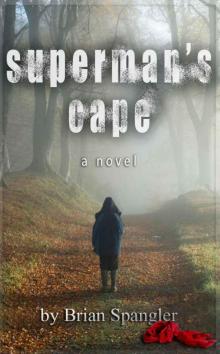 Superman's Cape
Superman's Cape Blinded By Sight (Gray Series Book 3)
Blinded By Sight (Gray Series Book 3)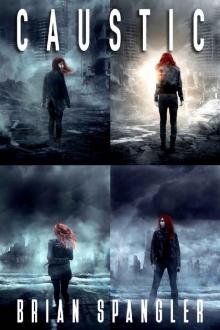 The Complete Four-Book Box Set
The Complete Four-Book Box Set Endure: Post-Apocalyptic Dystopian Thriller - Book 2 (Caustic)
Endure: Post-Apocalyptic Dystopian Thriller - Book 2 (Caustic)